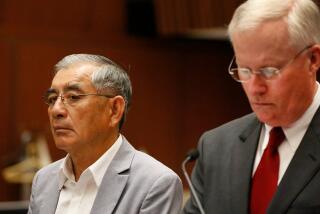Fund-Raiser Pleads Guilty, Gets Year’s Probation, Fine
- Share via
John Huang, whose fund-raising efforts for the 1996 Clinton-Gore campaign sparked congressional and Justice Department investigations, was sentenced to one year of probation Thursday after pleading guilty to a felony conspiracy charge.
Huang’s plea, entered in Los Angeles federal court, was the result of a deal with the Justice Department’s campaign finance task force, which agreed to recommend no jail time in exchange for his cooperation.
In addition to probation, Huang was ordered to perform 500 hours of community service and pay a $10,000 fine.
He could have received up to five years in prison and been fined $250,000.
“I am very sad and embarrassed by my mistakes that have brought disrepute to my family,” the 54-year-old Huang told U.S. District Judge Richard A. Paez before being sentenced.
As the Democrats’ chief fund-raiser in the Asian American community, Huang collected millions of dollars for the Clinton-Gore reelection campaign. Much of that money was later returned by the party amid allegations that it came from foreign donors, who are barred from contributing to U.S. elections.
But the charge to which he pleaded guilty was unrelated to the 1996 presidential race. It involved Huang’s fund-raising activities in 1992 and 1994 when he was employed as the top-ranking American executive for Indonesia’s Lippo Group.
Lippo’s owners, the Riady family, have been close friends of Bill Clinton since his days as governor of Arkansas and have figured prominently in the continuing controversy over alleged foreign contributions to the 1996 presidential campaign.
According to the criminal complaint against him, Huang used Lippo employees as straw donors to launder $7,500 in contributions that came from the company’s overseas accounts.
One donation of $2,500 went to Mike Woo’s 1993 campaign for Los Angeles mayor. Woo was defeated by Richard Riordan in that race. The other was a $5,000 contribution to the California Victory Fund ’94. The money was shared by Dianne Feinstein’s U.S. Senate campaign, the Democratic Senatorial Campaign Committee and the California Democratic Party.
In a memorandum to the judge earlier this month, Justice Department prosecutors said Huang “did not occupy the central role in organizing Lippo Group’s illegal campaign contribution scheme.”
It quoted Huang as telling investigators that his superior, who was not named in the document, decided to launder the funds through Lippo employees in the United States.
Lippo’s executives believed the donations were needed to establish contacts with “influential people to increase business for Lippo Group through its various affiliates overseas and in the United States,” the memo continued.
On the local level, the memo said, Lippo executives figured that political contributions would bring new business to three California affiliates involved in property development and permit LippoBank to open more branches.
Outside the courtroom Thursday, Assistant U.S. Atty. Daniel J. O’Brien, who heads the Justice Department probe on the West Coast, said “there is an ongoing probe with regard to the Lippo Group.” He declined further comment.
Huang, who lives in Glendale, has been questioned more than 20 times by federal investigators and prosecutors, including representatives of three independent counsels, one of them Whitewater prosecutor Kenneth Starr.
Asked recently why Huang was not charged with any crimes in connection with the Clinton-Gore reelection campaign, O’Brien responded: “We investigated all the allegations and felt that the charges in this case fully addressed his culpability.”
Huang was to have entered his plea Aug. 2, but the hearing was put off after Rep. Dan Burton (R-Ind.) wrote Paez asking that Huang first be required to testify before his committee, which is investigating campaign funding abuses.
Prosecutors said they feared that might result in another “Oliver North episode.” North was granted immunity from prosecution in the Iran-Contra affair for his testimony before Congress, which many lawmakers later conceded was a mistake.
With sentencing completed, Huang’s lawyer, Ty Cobb, acknowledged Thursday that his client would appear before Burton’s committee if subpoenaed.
In a statement issued afterward, Cobb condemned the “demonizing” of Huang and other Asian Americans in the fund-raising controversy.
“Americans have nothing to fear from Mr. Huang, but they do have much to fear from within,” he said. “Hatemongers, bigots and regrettably, even some of our elected officials, continue to tear at America’s greatest strength--its diversity--at an alarming and escalating pace.”
More to Read
Sign up for Essential California
The most important California stories and recommendations in your inbox every morning.
You may occasionally receive promotional content from the Los Angeles Times.













